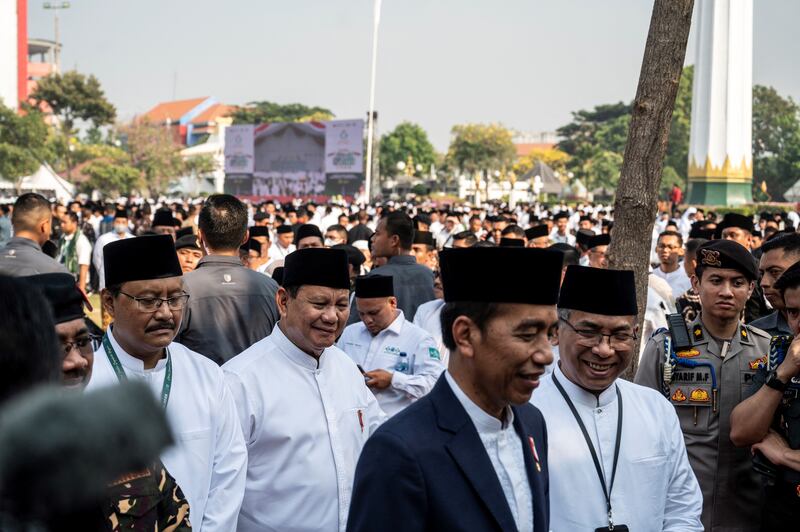Indonesian activists and legal experts are raising questions about an ethics panel set up by the country’s Constitutional Court this week to investigate accusations of bias and nepotism against itself over allowing the outgoing president’s son to run for vice president.
The questions about the panel's credibility surfaced after activists alleged that Jimly Asshiddiqie, a retired Constitutional Court judge and member of the ethics panel formed on Monday, had endorsed Prabowo Subianto, the frontrunner presidential candidate who picked Gibran Rakabuming Raka as his running mate.
“Jimly met with Prabowo in early May 2023, after which he expressed his support for Prabowo in the 2024 presidential election,” Yansen Dinata, the executive director of Public Virtue Research Institute, a prominent think-tank on democracy and civil rights, told BenarNews.
He also said that Jimly’s son, Robby Ferliansyah, was running for a legislative seat under Prabowo’s Gerindra Party.
Jimly, a constitutional law scholar who served as the inaugural head of the Constitutional Court from 2003 to 2008, said he was unfazed by the criticism and would soon look into all reports of alleged ethical violations.
“Independence is not something you only talk about,” he said. “Ethics is not about words, but also actions.”
The panel was established after lawyers and good governance groups accused the Constitutional Court, whose chief judge is married to the sister of term-limited President Joko “Jokowi” Widodo, of issuing a politically motivated ruling that favored the president’s son.
Critics allege that last week's ruling, which carved out an exception to the existing bar for candidates younger than 40 from running in presidential elections, paved the way for Gibran, 36, to run as vice president.
He serves as mayor of Solo, the Central Java city where his father, Jokowi, was born and started his political career.
The Constitutional Court, one of the country’s apex courts separate from the Supreme Court, can settle election disputes, review laws and address constitutional questions.
Anwar Usman, the chief of the nine-member court, had previously recused himself from similar cases over personal and family interest concerns, but participated in the latest one.
He has defended the contentious ruling as based on legal arguments and constitutional principles, but nonetheless agreed to institute the three-member ethics board of former judges to review the allegations.

Critics, including Muhammad Isnur, executive director of the Indonesian Legal Aid Foundation, a civil society pressure group, said they questioned the board’s credibility.
“Of course, the ethics board is controversial, and it’s difficult to restore the dignity of the Constitutional Court because we have lost trust in it,” he told BenarNews.
“This is a challenge for the Constitutional Court and the board. Can they be ethical? Can they be independent in investigating the judges who are alleged to have violated ethics?”
Feri Amsari, who teaches constitutional law at Andalas University in West Sumatra, said previous ethics boards’ decisions almost always sided with judges accused of breaches.
“The reason why the decisions tend to favor constitutional judges is that the board members are mostly former judges themselves. They have emotional ties with their fellow judges,” he told BenarNews.
Jokowi has directly avoided addressing the controversy and has not formally endorsed candidates in the current race.
On Tuesday, however, he approved his son’s nomination for vice president in a letter as part of a legal requirement, said Ari Dwipayana, an aide to the president.
“As parents, we can only support and give [our] blessing,” Jokowi told reporters on Sunday, referring to his son’s nomination. “It’s his decision because he’s an adult, and we should not interfere in our children’s decisions.”
Jokowi is the first Indonesian president outside the country’s military or political elite. The former furniture businessman and mayor of Solo was elected president in 2014 after a campaign that painted him as a man of the people.
He has been widely praised for revamping Indonesia’s dilapidated infrastructure during his nine years in office.
But he has also been criticized for his administration's crackdown on dissent, his weakening of anti-corruption efforts and his compromise on human rights.
In his second term, Jokowi appointed Prabowo, an ex-special forces commander accused of being tied to human rights abuses during his career as a soldier, as his defense chief. Prabowo has been the frontrunner for much of the campaign season this time around and holds a narrow lead over other candidates, according to recent opinion polls.
Gibran’s elevation to Prabowo’s running mate appeared to signal the outgoing president’s unspoken endorsement of their candidacy and the potential transformation of his legacy into a dynasty.
